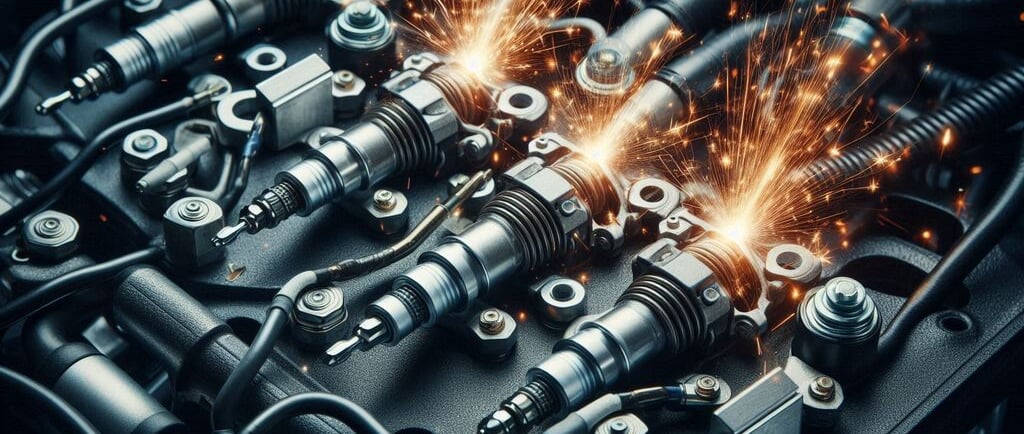Ignition Coils and Spark Plugs
If you’ve ever experienced a rough start or noticed your engine isn’t performing at its best, ignition coils and spark plugs could be the culprits.
ELECTRICAL SYSTEMS
11/14/20244 min read


Ignition Coils and Spark Plugs: The Heartbeat of Your Engine
If you’ve ever experienced a rough start or noticed your engine isn’t performing at its best, ignition coils and spark plugs could be the culprits. These essential components are at the heart of your car’s combustion process, sparking the power that propels you down the road. But how exactly do they work, and what signs should you look for to know when they’re due for a replacement?
This guide breaks down everything you need to know about ignition coils and spark plugs, from how they function to signs of wear and maintenance tips.
What Are Ignition Coils and Spark Plugs?
Ignition Coils: The Power Behind the Spark
Ignition coils are a critical part of your vehicle’s ignition system. They convert the car battery’s low voltage into the high voltage needed to create a spark, igniting the fuel-air mixture inside each cylinder. Every engine cylinder has a coil that ensures there’s enough power to create a spark at just the right time.
Without a functional ignition coil, the engine misfires, which can lead to poor fuel efficiency and even engine damage over time.
Spark Plugs: The Spark that Starts it All
Spark plugs are the small but mighty components responsible for igniting the fuel-air mixture in each cylinder, creating the small explosion that powers your engine. Positioned at the top of each cylinder, spark plugs are designed to withstand high temperatures and pressure, delivering a precise spark at the perfect moment.
Combined, ignition coils and spark plugs create a reliable and consistent combustion process, which keeps your vehicle running smoothly and efficiently.
How Ignition Coils and Spark Plugs Work Together
Ignition coils and spark plugs work as a team to ignite fuel and power your engine. Here’s a simple breakdown:
Voltage Conversion: The ignition coil boosts the battery’s low voltage to a high voltage, typically around 20,000 volts or more.
Spark Delivery: This high voltage is sent to the spark plugs, where it jumps across the spark plug gap to create a spark.
Combustion Ignition: The spark ignites the fuel-air mixture in the engine’s cylinder, causing combustion and producing power.
When both components are in good working order, the combustion process is efficient and smooth. However, a faulty coil or worn spark plug can disrupt this delicate process, causing a misfire and reducing engine performance.
Signs Your Ignition Coils and Spark Plugs Need Attention
Over time, ignition coils and spark plugs experience wear and tear, which can impact your engine’s performance. Here are some common signs that it might be time for a replacement:
Engine Misfire: A misfire occurs when the fuel-air mixture doesn’t ignite properly. This can cause your engine to stutter, particularly when accelerating.
Poor Fuel Economy: If you’re filling up more often, it might be because worn spark plugs or coils are causing inefficient combustion.
Rough Idling: If your vehicle vibrates excessively or sounds rough when idling, it may be due to a worn spark plug or faulty ignition coil.
Difficulty Starting: A struggling ignition system can make it hard to start your car, especially in cold weather.
Check Engine Light: Your car’s onboard computer will often trigger the check engine light when there’s a problem with the ignition coils or spark plugs.
If you’re noticing any of these symptoms, it’s wise to have your ignition system checked. Replacing faulty ignition coils or spark plugs can restore your vehicle’s performance and prevent further damage.
How Often Should You Replace Ignition Coils and Spark Plugs?
Spark Plug Replacement Schedule
Typically, spark plugs last between 30,000 to 100,000 miles, depending on the type and make of the spark plug. Conventional spark plugs tend to have a shorter lifespan, while iridium and platinum spark plugs, commonly used in modern vehicles, offer extended performance.
Ignition Coil Replacement
Ignition coils don’t need to be replaced as often as spark plugs, but they can wear out over time, especially if they’re exposed to high heat or vibration. Most experts recommend checking your coils every 60,000 to 100,000 miles, but they should be inspected earlier if you’re experiencing symptoms like misfires or rough idling.
When replacing spark plugs, it’s often a good idea to have the ignition coils checked as well, as they work in tandem. Regular maintenance can prevent sudden failures and keep your engine running smoothly.
Tips for Maintaining Your Ignition Coils and Spark Plugs
Maintaining ignition coils and spark plugs can improve your vehicle’s performance, reduce emissions, and even save on fuel costs. Here are a few maintenance tips:
Stick to a Regular Schedule: Check your owner’s manual for the recommended service intervals for spark plugs and coils, and stick to that schedule.
Use High-Quality Parts: Choosing quality spark plugs and ignition coils can increase their lifespan and improve engine efficiency.
Avoid Short Trips: Short trips can cause a build-up of unburned fuel, putting extra strain on your ignition system. Combining errands into fewer trips can help extend your parts’ lifespan.
Inspect for Damage: Check for visible signs of wear, such as cracks or corrosion, especially after hitting milestones like 60,000 miles.
Ignition Coils and Spark Plugs: Why They’re Worth the Investment
While replacing ignition coils and spark plugs may seem like a minor maintenance task, keeping these components in good condition is essential for long-term vehicle performance. Regular maintenance can enhance your fuel efficiency, extend your engine’s lifespan, and help you avoid costly repairs down the road.
Real-Life Example: Imagine you’re on a road trip and suddenly notice your engine misfiring. It not only affects your vehicle’s performance but also dampens the joy of the journey. Replacing ignition coils and spark plugs on time prevents such interruptions and keeps your vehicle performing at its peak.
Wrapping Up: Take Care of Your Ignition System
In summary, ignition coils and spark plugs are vital components that work together to power your engine. Staying on top of their maintenance can save you from unnecessary expenses and keep your car running smoothly.


